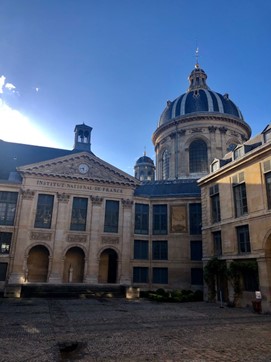Christophe Gillain is a PhD student in the History Faculty at the University of Cambridge. Here he talks about his research at the Bibliothèque de l’Institut de France.
The existence of the Bibliothèque de l’Institut de France is a legacy of the turbulent politics of the French Revolution. Intended to replace the abolished royal academies (condemned by l’abbé Grégoire as ‘riddled with an incurable aristocracy’), the Institut was created by the National Convention in 1795. Central to the new learned society was a working library, tasked with gathering an ‘encyclopaedic’ collection. To further this aim, the Institut was assigned the 24,000 volumes and 2000 manuscripts previously housed in the library of the city of Paris. It was also given its pick of works confiscated during the Revolution, along with books owned by the defunct academies.

As a result of this history – as well as later donations – the Bibliothèque de l’Institut possesses archival material of interest to researchers in a wide range of fields, spanning the sixteenth to nineteenth centuries. The library’s website (https://www.bibliotheque-institutdefrance.fr/) details many of these holdings, while its online catalogues allow you to search for both printed and manuscript sources. The Bibliothèque de l’Institut is located in the Institut de France’s complex in the heart of Paris, near the Pont des Arts. Originally constructed on the orders of Cardinal Mazarin, the buildings also include the Bibliothèque Mazarine (one of the most beautiful libraries in the city and my favourite place to work).

My research took me to the Bibliothèque de l’Institut to consult the papers of Régis de Chantelauze, a nineteenth-century scholar. Chantelauze amassed a vast trove of correspondence, memoirs, and other documents pertaining to Cardinal de Retz, one of the seventeenth-century French exiles that my thesis examines. Retz fled to Rome in 1654 after being imprisoned for his participation in the Fronde against the French government. These sources were invaluable in my efforts to understand the networks that sustained such exiles at home and abroad. One of the richest documents I looked at was an unpublished manuscript account of Retz’s early years in exile by his agent in Rome, l’abbé Charrier.
After the French Revolution, the academies (most famously the Académie française) were restored, and today the Institut is an umbrella organisation for the five academies of France. This means there are some quirks when it comes to accessing the Bibliothèque de l’Institut. First, you need a letter of recommendation from a member of one of the academies. While this may sound intimidating, it’s really just a formality if you have a valid reason to consult documents held by the library. You can obtain the letter by emailing the director of the library. Make sure that you send off your request early enough so that you have the letter before you turn up (in my experience it took about a week). When you arrive at the Institut, you’ll need the letter as well as your passport. Once you’ve identified yourself to the receptionists, they’ll phone for a librarian to escort you. When I visited, France’s vaccine certificate, the passe sanitaire, was also required for access.
The Bibliothèque de l’Institut is normally open on Monday to Friday, from 12 pm to 6 pm. But because of the library’s special status as part of the academies, ceremonial sessions or coupoles (named for the Institut’s impressive dome) often take place. They occur so regularly that the library staff gave me a printed schedule to keep track. On these days, the Bibliothèque de l’Institut is open from 10 am to 1 pm. If you arrive before 1 pm, you can keep consulting your documents in the Bibliothèque Mazarine next door until 6 pm.

Easily accessible by bus and within a few minutes’ walk of the Métro stop Louvre-Rivoli, the Bibliothèque de l’Institut is perfectly located for anyone travelling to Paris for research. I recommend wandering down into Saint-Germain or across the river and through the Louvre to find a good boulangerie or café – I spent many an afternoon eating a sandwich and watching Parisian life go by in the Jardin des Tuileries.
Christophe Gillain is a PhD student in the History Faculty at the University of Cambridge. His thesis is funded by the Cambridge Trust and examines French noble exile in seventeenth-century Europe. His research interests include mobility, transnational aristocratic networks, and the political culture of Bourbon France.
Thank you very much for this, Christophe!


